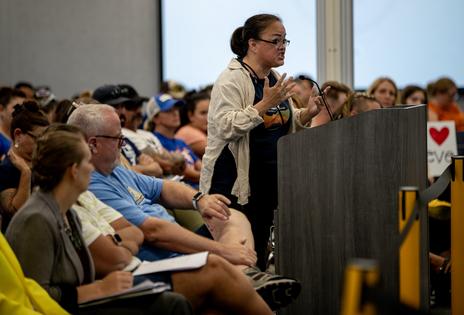Where the Supreme Court stands on banning books
Published in Political News
Efforts to ban books in public schools and public libraries reached an all-time high in 2022 and show few signs of abating for 2023, according to the American Library Association.
The recent movement to remove books appears to be a coordinated campaign taking place at both the state and local levels; it often targets books that address race, gender or both. Some of these efforts have resulted in laws that threaten to jail librarians.
Most Americans oppose removing books from libraries. That may explain why Illinois recently enacted a law that outlaws banning books: If any public library in the state bans materials because of “partisan or doctrinal” disapproval, it will be ineligible for state funds.
Bans – and the banning of bans – have already ended up in the courts. For example, in a lawsuit in Florida, a First Amendment advocacy group, a publisher, parents and authors whose books have been targeted filed suit against the Escambia County School District’s removal of 10 books and restriction of 100 others in the school library. They alleged that school officials violated students’ First Amendment rights when they removed books that discussed, race, racism and LGBTQ+ people. The case is ongoing.
One or more of these sorts of cases could end up at the Supreme Court – but until then, the lower courts will look to existing precedent, set in a legal ruling that dates back to 1982. In that ruling, the court declared that school personnel have a lot of discretion related to the content of their libraries, but this “discretion may not be exercised in a narrowly partisan or political manner.”
My analysis of that 1982 case, Board of Education, Island Trees Union Free School District v. Pico, finds useful information that can help put these book ban lawsuits in context.
The case specifically focused on the school library and was not about curriculum in the classroom. A school board on Long Island, New York, wanted certain books removed from the shelves of the junior high and high school libraries because board members believed the books to be, they said, “anti-American, anti-Christian, anti-Semitic, and just plain filthy.”
The banned titles originated in a list compiled by a conservative organization that deemed them objectionable.
One student, on behalf of four other students in the school district, filed a lawsuit in U.S. District Court. The suit claimed that removing the books from the library infringed upon the students’ First Amendment rights to freely access ideas and information.
The school board prevailed in U.S. District Court because the judge found that school boards should have discretion in those matters. But the appeals court overturned that ruling, saying the fact that the school board’s reasoning relied in part on external evaluations of the books raised concerns about censorship.
When the case came before the Supreme Court in 1982, the justices agreed to analyze whether the school board’s decision to bar certain books from its libraries, based on the books’ content, violated the students’ rights.
The ruling was divided – five justices affirmed the appeals court’s decision in favor of the students, though not all of them agreed on exactly why.
Justice William Brennan Jr. wrote that the First Amendment does limit school officials’ authority to remove books from school libraries, because that authority infringes on students’ rights to receive ideas and information. Justices Thurgood Marshall and John Paul Stevens signed on to this opinion, which was not a majority opinion. Two justices wrote concurring decisions, but only one agreed with the trio’s overall conclusion that the board had unconstitutionally infringed on students’ rights. Justice Harry Blackmun said the government – the school board – could not deny students access to ideas based on political reasons. Justice Byron White agreed with the conclusion, but did not express a view on the First Amendment question.
Four justices dissented. Chief Justice Warren Burger wrote the main dissent, which was joined by Justices Lewis Powell, William Rehnquist and Sandra Day O'Connor. Their opinion focused more on the issue of accessing books than it did on the First Amendment questions the case raised.
Though there was not a clear majority opinion, the case suggests that school boards have broad discretion over library books but do not have unlimited authority to remove books from library shelves.
The justices agreed that a school library is a place where important information is disseminated to learners – and is a unique place for students to engage in inquiry related to their interests and passions. Therefore, they ruled, school officials may remove books only for sound educational reasons or legitimate purposes – such as pervasive vulgarity or lack of educational suitability.
As a result, school personnel are likely limited in their power to restrict books’ availability simply because they or other officials disagree with the books’ content.
If any of the current cases reach the Supreme Court, the current justices could rule differently, of course. But in the meantime, lower courts hearing book-banning cases will be guided by that precedent.
High school student Ian Shaw contributed to the research and writing of this article.
This article is republished from The Conversation, an independent nonprofit news site dedicated to sharing ideas from academic experts. The Conversation has a variety of fascinating free newsletters.
Read more:
Supreme Court justices’ ideologies don’t always fit ‘liberal’ and ‘conservative’ labels
US Supreme Court refuses to hear Alabama’s request to keep separate and unequal political districts
Suzanne Eckes does not work for, consult, own shares in or receive funding from any company or organization that would benefit from this article, and has disclosed no relevant affiliations beyond their academic appointment.


























































Comments